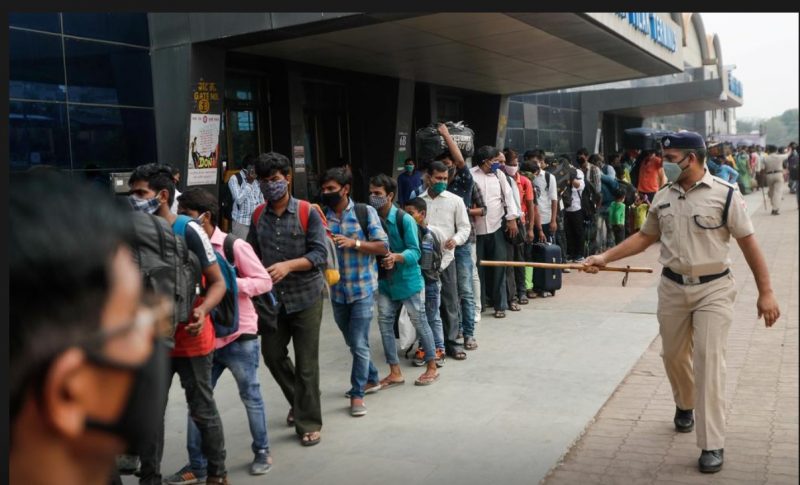(AF) With unprecedented spikes in daily Covid infection rates and several states reporting extreme shortages of vaccines, India banned the export of anti-viral drug Remdesivir and its active pharmaceutical ingredients on Sunday.
And, shaken by the looming vaccine crises, on Monday India also approved Russia’s Sputnik V vaccine for restricted use in the country.
“The export of injection Remdesivir and Remdesivir active pharmaceutical ingredients (APIs) is prohibited till the Covid situation in the country improves,” New Delhi said in a statement.
Read more: Hainan opens door to foreign cash in pursuit of ‘Hawaii’ dream
India has witnessed a record surge in Covid cases with over 168,000 new cases in the last recorded 24-hour period, the sixth record rise in seven days, pushing the country’s caseload to over 13.5 million. The resurgence of the virus has led to 904 new deaths, taking the total death count to 170,179.
“This has led to a sudden spike in demand for Remdesivir. There is potential for a further increase in this demand in the coming days,” the statement said.
The industry estimates, though, that not more than 10% of production was being exported.
Seven Indian companies produce Remdesivir under a voluntary licensing agreement with US-headquartered Gilead Sciences. The country’s installed capacity is 3.90 million units per month.
Laid-Back India
Authorities have blamed the ferocious resurgence of the virus mainly on crowding and a reluctance to wear masks.
Still, religious gatherings have continued and Prime Minister Narendra Modi and Home Minister Amit Shah have themselves addressed election campaigns attended by tens of thousands of people, many without masks and hardly any following social distancing.
As new cases surged, harried relatives of patients made a kilometre-long queue to buy Remdesivir outside a big hospital in the western state of Gujarat, reports said.
In addition to the Remdesivir ban “till the situation improves”, the health ministry said that manufacturers had been asked to step up supplies.
“Given what we are seeing in India, this may be the right step and we are anyway prioritising most of the supplies for India,” said an official from Cipla, a local Remdesivir manufacturer.
Low Stocks
Others like Hetero, Cadila Healthcare, and Mylan also said they are in the process of ramping up production. The Remdesivir bans also comes as India, the world’s largest vaccine manufacturer, is facing a Covid vaccine shortage, that forced the country to stall major exports of vaccines as supplies have started running dry.
Already 10 Indian states have reached out to New Delhi for assistance as many claim that their stocks will only last for a few days.
Reportedly, many hospitals and vaccination centres in states like Maharashtra, Chhattisgarh, Odisha, Andhra Pradesh and Jharkhand have started turning vaccination candidates away and shutting early as supplies ran out.
India’s severely-hit state of Maharashtra-which reports the country’s highest cases and deaths – was the first to flag the vaccine shortage.
Health minister Rajesh Tope said last week that the state needed 4 million doses every week from New Delhi. Maharashtra alone accounts for over 51% of the total active cases in the country, according to the health ministry.
Five Days
According to LocalCircles, a community social media platform, reports from states have suggested that the country had just over five days of vaccine stocks [on April 10], with an additional week’s supply in the pipeline.
In states like Andhra Pradesh and Bihar, a stock-out could happen in about two days, while Odisha had just about enough for four days, LocalCircles claimed.
The community also reported that 18% – or one-fifth – of those scheduled for the first dose of the vaccination could not find a dose when they went for it in the first 10 days of April.
The shortage, noted LocalCircles, could be due to suboptimal local distribution, although certain centres had a genuine shortage.
As the 2nd wave of Covid gained strength, 77% Indians expressed interest in taking the vaccine, versus the 38% when India started its vaccination drive three months back.
‘Supply Mismatch’
“This decline in vaccine hesitancy could also be contributing to the demand-supply mismatch,” the survey said.
India’s largest vaccine maker, Serum Institute of India, currently produces 2 million doses of Aztra Zeneca-Oxford University’s Covishield vaccines a day, while Bharat Biotech’s home-grown Covaxin churns out another 0.3 million doses a day.
If India continues to vaccinate 3 million people daily, and if these two providers are unable to scale their production, India will need to import vaccines from other countries, the survey said.
And that move would have the support of 56% Indians who also want India to get the Pfizer, Moderna, and J&J jabs, it added.
Sputnik Approval
Meanwhile, India’s rattled drug regulator approved Russia’s Sputnik V vaccine on Monday based on a “very strong immunogenicity data”, said reports, although no official confirmation had been issued by the regulator at the time of writing.
Sputnik has been developed by the Gamaleya Research Institute of Epidemiology and Microbiology in Russia.
In mid-March, Hyderabad-based Gland Pharma, a subsidiary of China’s Fosun Pharma, announced a collaboration with the Russian Direct Investment Fund (RDIF) to make up to 252 million doses of the Sputnik V Covid vaccine in the country.
Vaccine Doses
Additionally, India’s Hetero already has a deal in place to produce over 100 million doses of the vaccine, which has proven to be 91.6% effective against the Covid virus.
Drug-maker Dr Reddy’s Laboratories, too, has been holding small clinical studies of Sputnik domestically and had sought emergency use approval for the vaccine last month.
Already approved in 22 countries, with the RDIF signing supply deals with over 13 countries, the two-dose Sputnik vaccine, costs less than $10 for each shot in international markets and can be stored at 2 to 8 degrees Celsius in dry form.
- Indrajit Basu, with reporting by Reuters.
Also on AF:
India’s Gland Pharma to make Russian Sputnik V Covid vaccine
India reports record rise in daily coronavirus cases
























